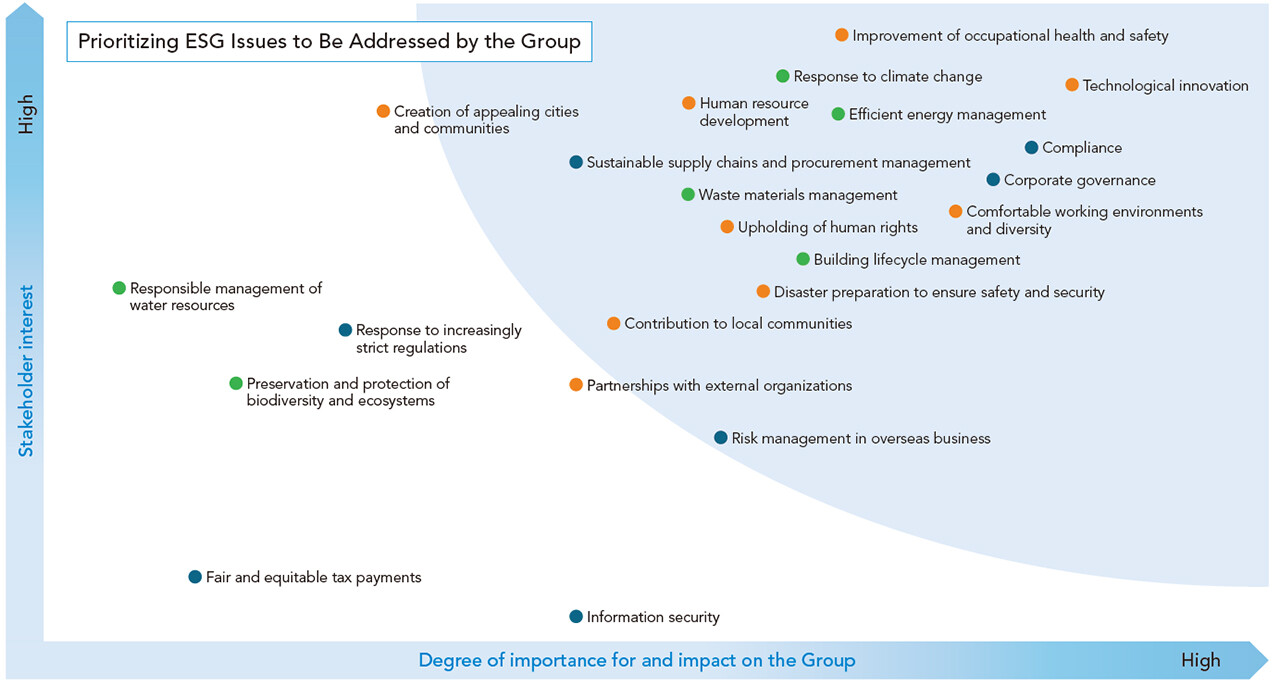ESG Materiality
ESG Materiality
We have reviewed our initiatives based on our Basic Principles and determined six ESG materialities. By incorporating materiality into our Medium-Term Business Plan and promoting it steadily, we aim to achieve medium- to long-term growth of Obayashi Group and a sustainable society.
Six ESG Materialities
The Process of Determining Material Issues
STEP1: Identify the relevant challenges
A comprehensive list of about 300 ESG challenges was drawn up based on international guidelines (*1) and the Sustainable Development Goals (SDGs) and such, incorporating opinions from external organizations. From this, we drew out 22 ESG challenges relevant to the Obayashi Group.
STEP2:Prioritize the challenges
Next, we evaluated the 22 ESG challenges identified in the previous step in terms of stakeholder interest and significance and impact on the Obayashi Group.
STEP3:Determine the material issues
Based on the results of prioritizing, we took account of the Obayashi Basic Principles, consistency with our business strategy, and the like and selected six challenges. Upper management deliberated and determined that these would be the material issues of the Obayashi Group.

*1 International guidelines
・IIRC (International Integrated Reporting Council)
・SASB (Sustainability Accounting Standards Board)
・GRI (Global Reporting Initiative)
・WEF (World Economic Forum)
・MSCI ESG Index
Impact on our Business, Action Plans, and KPIs
Based on the impact assessment for the Obayashi Group, we set up action plans and KPIs (Key Performance Indicators). We aim to achieve KPI goals by rotating these action plans in the PDCA cycle. The degree of achievement is reviewed once a year and reviewed as appropriate.
ESG Financing
Obayashi has issued corporate bonds (ESG Financing) limited in funds to solve social issues such as environmental problems.
Obayashi Green Bond
Obayashi Corporation has issued Obayashi Green Bond (Obayashi Corporation's 23rd Series of Unsecured Bonds) through a public offering in the Japanese domestic bond market. Green bonds are any type of bond instrument issued by companies, local governments, or other organizations where the proceeds will be exclusively applied to eligible green projects and which are aligned with the Green Bond Principles (International Capital Market Association) and/or the Green Bond Guidelines (Ministry of the Environment, Japan).
Obayashi Sustainability Bond
Obayashi Corporation has issued Obayashi Sustainability Bond (Obayashi Corporation's 24th Series of Unsecured Bonds) through a public offering in the Japanese domestic bond market. Sustainability bonds are bonds issued in accordance with the Green Bond Principles, Social Bond Principles, and Sustainability Bond Guidelines of the International Capital Market Association (ICMA), and/or the Green Bond Guidelines of the Ministry of the Environment, Japan. It is intended to raise proceeds for projects that address or solve specific social issues, achieve positive social outcomes (social project), or contribute to environmental sustainability including climate change (Green Project).
Obayashi Sustainability-Linked Bond
Obayashi Corporation has issued a combination of Obayashi Sustainability-Linked Bonds (Obayashi Corporation's 25th and 26th Series of Unsecured Bonds) through a public offering in the Japanese domestic bond market. Floated are sustainability-linked bonds with different maturity dates, the first type of sustainability bond in Japan. The issuance of such ESG-linked bonds follows the Obayashi Green Bond (Obayashi Corporation's 23rd Series of Unsecured Bonds) in October 2018 and the Obayashi Sustainability Bond (Obayashi Corporation's 24th Series of Unsecured Bonds) in June 2019.
2nd Obayashi Sustainability-Linked Bond
Obayashi Corporation has issued 2nd Obayashi Sustainability-Linked Bond through a public offering in the Japanese domestic bond market.


